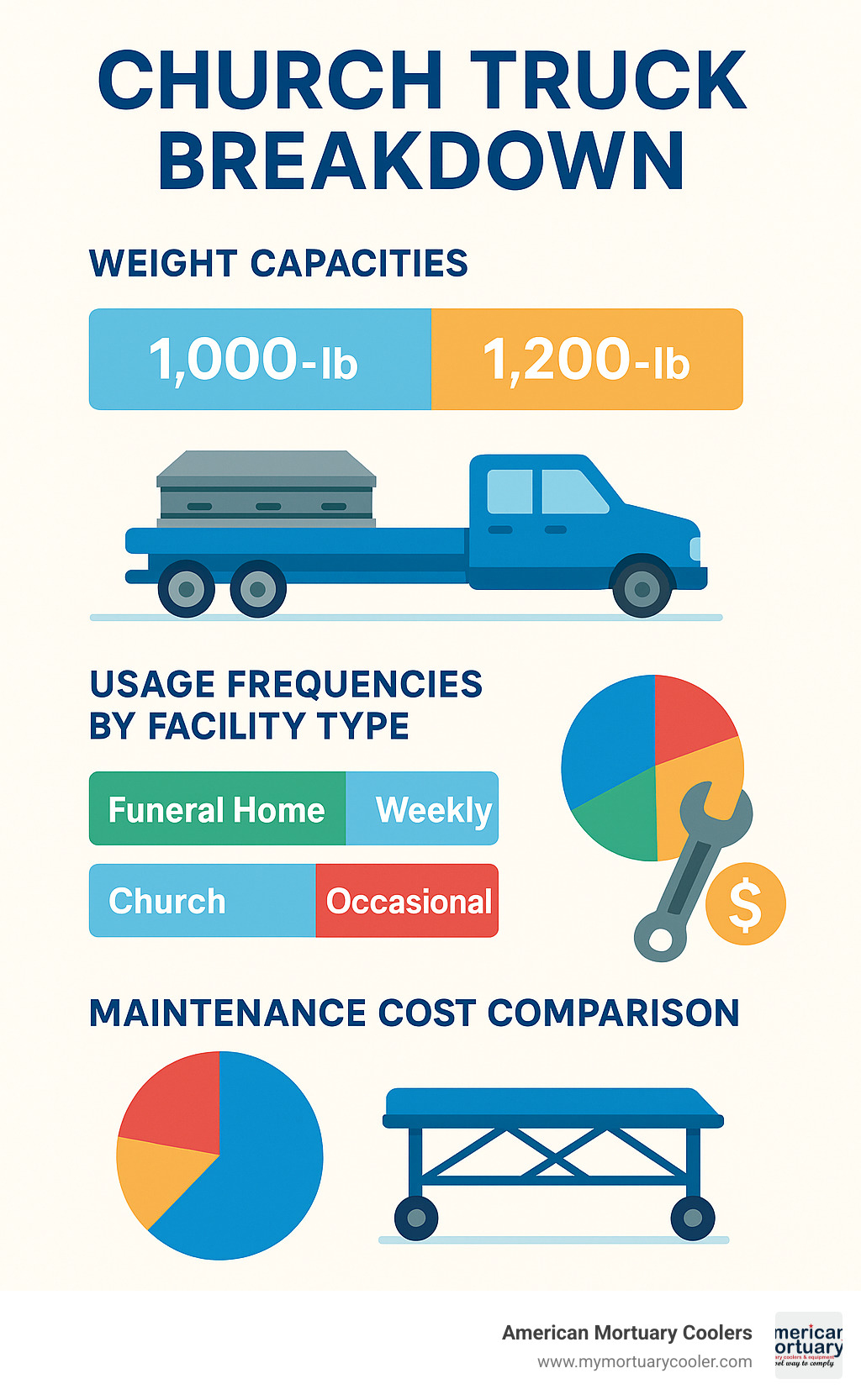Why Church Trucks Are Essential for Dignified Funeral Services
Church-truck- equipment serves as the backbone of respectful funeral operations, providing safe and dignified transport of caskets from hearses to gravesites and within funeral facilities. These specialized wheeled platforms support heavy loads while maintaining the solemnity required during services.
Key Church Truck Types & Uses:
- Casket trucks - Transport caskets safely (1,000+ lb capacity)
- Cemetery trucks - Steer rough terrain with pneumatic wheels
- Utility trucks - Move funeral equipment and supplies
- Passenger vehicles - Transport congregation members (9-57 passengers)
- Mobile chapels - Provide outreach and mission services
Church trucks eliminate the physical strain on pallbearers and funeral staff while ensuring caskets remain stable during transport. Standard models like the Ferno 87 and 88 support 1,000 lbs, while premium units handle up to 1,200 lbs with features like adjustable X-frames and four-position locking systems.
The equipment ranges from compact folding models that collapse to just 5 inches wide for storage, to specialized casket transporters that allow one person to safely move four caskets. Churches and funeral homes also use passenger vehicles - from 9-passenger vans to 57-passenger buses - for group transportation and community outreach.
As Mortuary Cooler, I've worked extensively with funeral homes nationwide to specify the right church-truck- equipment for their unique operational needs and space constraints.
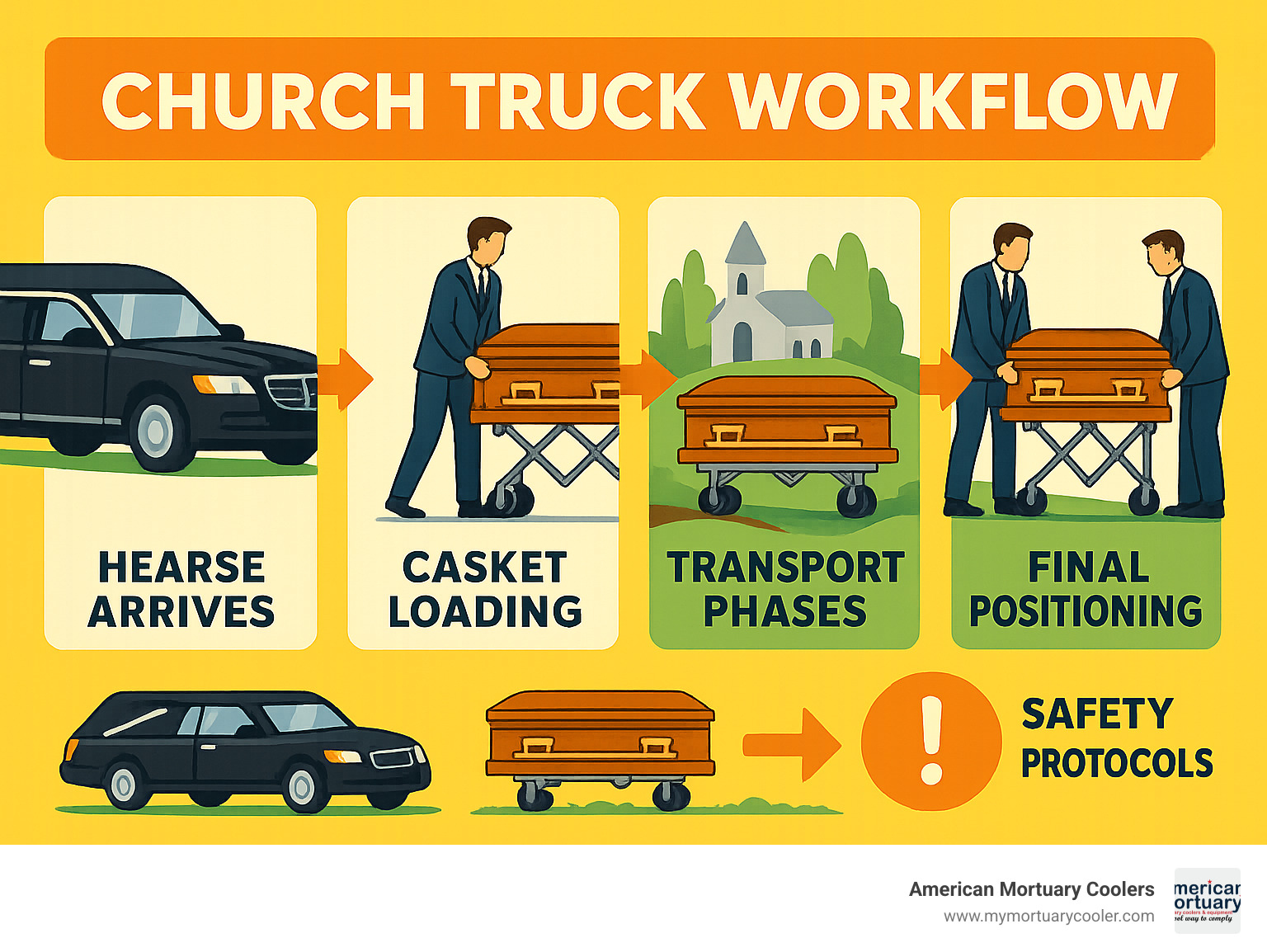
Quick church-truck- terms:
Understanding the church-truck-: Definition & Purpose
A church-truck- is a specialized wheeled platform designed to transport caskets and heavy funeral equipment while preserving the solemnity of services. These units handle the heavy lifting when traditional pallbearer strength isn't enough or when safety demands a more secure solution.
The primary mission centers on dignity and safety. They smoothly transport caskets from hearses to church altars, guide them from sanctuary to graveside, and steer challenging outdoor terrain like grass, gravel, or uneven cemetery grounds.
Weight support stands as the most critical function. Modern caskets can easily exceed what human pallbearers should safely handle. Standard church truck models support 1,000+ pounds with full safety margins, while premium units handle up to 1,200 pounds.
Historical roots & modern evolution
Church trucks began with a simple need: pallbearer relief. Traditional funeral practices demanded multiple people carry heavy caskets throughout services, creating safety hazards and logistical challenges.
The breakthrough came with aluminum frames replacing heavy steel construction. This made trucks easier to maneuver while increasing structural integrity. Pneumatic wheels revolutionized outdoor cemetery operations by providing smooth rolling over grass and rough terrain.
Today's church trucks incorporate ergonomic handles, multiple locking positions, and collapsible designs for storage.
How church trucks differ from dollies & mortuary cots
| Feature | Church Truck | Mortuary Cot | Standard Dolly |
|---|---|---|---|
| Load Capacity | 1,000-1,200 lbs | 500-750 lbs | 200-500 lbs |
| Wheel Type | 6-8" pneumatic/rubber | 4-6" swivel casters | 2-4" hard wheels |
| Locking Positions | 3-4 adjustable heights | Fixed height | No height adjustment |
| Frame Design | X-frame with cross-bars | Flat platform | Basic rectangular |
| Terrain Capability | Grass, gravel, carpet | Indoor smooth surfaces | Indoor hard surfaces |
The X-frame design represents the most significant difference, providing stable undercarriages with cross-bars that secure caskets during transport. Wheel configuration also sets church trucks apart with larger pneumatic wheels that tackle outdoor terrain.
More info about church truck options
Types of Church Trucks & Related Vehicles
The church-truck- family includes specialized vehicles serving different needs in funeral services and religious outreach. Different situations call for different solutions - some handle casket transport, others carry people to services or bring mobile ministry to communities.
Casket-handling church-truck- models
The Ferno Model 87 and 88 handle 1,000-pound loads reliably. The Model 87 weighs 36 pounds but measures 61 inches long by 18 inches wide. Its X-frame design with rubber bumpers keeps caskets secure, while six-inch rubber wheels roll quietly over various surfaces. The four-position locking system adjusts height for different casket sizes.
The MOBI CT-100 series offers upgraded features with 1,000+ pound capacity at only 35 pounds thanks to aluminum construction. The adjustable X-frame provides stability, and units collapse to 5 inches wide for storage.
Top-tier CT-200 models support 1,200 pounds with double cross-bar supports, easy-glide 6-inch wheels with two-way locking, and three-position height adjustment.
More info about church truck options
Passenger & outreach rigs
Nine to 15-passenger vans work for youth groups and small mission teams. 25-35 passenger mid-size buses handle larger events, while full-size church buses carry 40-57 passengers for major outings.
Many churches choose mobility-accessible buses accommodating wheelchairs alongside regular seating. Custom builds like The Worship Truck transform into mobile ministry platforms with sound systems and staging areas.
Specialty builds for missions & community service
Gospel Chariot Missions operates 15 mobile chapel vehicles across 20 African countries, reaching remote communities where permanent buildings aren't feasible. In three months, they reported 330 baptisms using mobile ministry.
Mobile baptism units feature complete water systems for conducting baptisms at beaches and community events. Disaster relief trailers combine storage and service capabilities, providing mobile command centers during crisis response.
Key Features, Specs & Accessories That Matter
When shopping for a church-truck-, specifications directly impact service safety and smoothness. Load capacity sits at the top priority. Standard units handle 1,000 pounds, while premium models reach 1,200 pounds - providing crucial safety margins.
Aluminum construction offers the sweet spot between strength and weight. Wheel selection determines terrain capability and noise levels. Six-inch pneumatic wheels roll smoothly over grass and gravel, while rubber wheels work quietly on indoor surfaces.
Anatomy of a premium truck
Premium church-truck- units earn their price through thoughtful engineering. 1,200-pound weight ratings come from double cross-bar construction spreading loads evenly. Easy-glide 6-inch wheels with two-way locking provide smooth transport and secure positioning.
Anodized aluminum construction combines strength with minimal maintenance. Rectangular tubing provides better strength than round tubes and gives caskets stable platforms.
Essential accessories & add-ons
Church truck drapes transform utilitarian equipment into dignified funeral pieces. Premium drapes with 12-pleat designs and reinforced grommets attach securely. Crushed velvet materials maintain appearance while fluid-resistant linings protect against spills.
Casket transporters cost around $6,900 but let one person safely move four caskets using powered tilting decks. Roller beds make loading smoother and safer with durable glide strips.
More info about funeral supply store
Maintenance & storage best practices
Mild soap and water handle most cleaning of anodized aluminum finishes. Monthly lubrication of wheel bearings and locking mechanisms prevents problems. Quality church trucks fold to 5 inches wide for efficient storage.
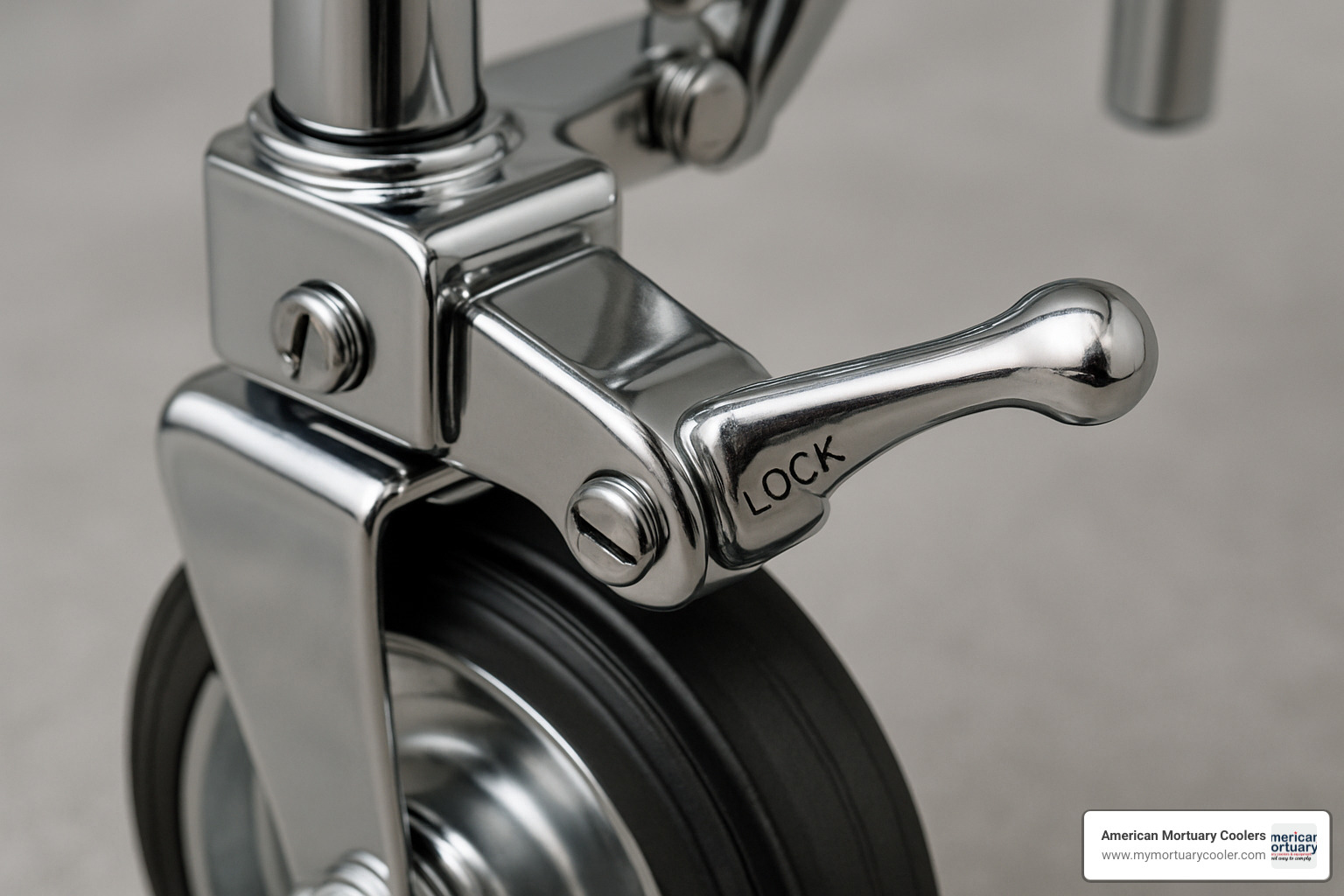
Safe Selection, Operation & Legal Compliance
Operating church-truck- equipment safely protects people who trust you with their loved ones' final journey. Nearly 20% of traffic accidents stem from poor vehicle maintenance, making solid policies essential.
Every operator carries your organization's reputation and responsibility. Driver policies need age requirements, driving records, and specialized training. Background checks become essential when transporting minors. Maintenance logs aren't just paperwork - they're legal protection documenting every inspection and repair.
Selecting qualified drivers for church-owned vehicles
Drivers should be at least 21 years old with clean driving records - no more than one at-fault accident in three years and zero reckless violations in five years. Commercial drivers with less than one year experience face higher crash rates.
For trips over 300 miles, two qualified drivers combat fatigue. Every passenger needs working seatbelts, and passenger count cannot exceed available restraints. When transporting minors, parental consent and liability releases protect everyone.
Who Should Be Driving Church-Owned or Church-Rented Vehicles? — Reynolds Law Group
Operating guidelines to prevent injury & liability
Four-point wheel locks must be engaged before loading or unloading caskets. Two-person lift limits protect staff from injury during manual positioning. ADA considerations for accessible pathways and wheelchair access aren't optional - they're legal requirements.
Legal & insurance checkpoints
Standard personal auto policies typically exclude church activities, making specialized commercial coverage essential. DOT weight classifications require commercial licenses for heavier vehicles. Distracted driving contributes to over 3,000 fatalities annually, making prevention policies crucial.
Church Safety and Security | Use of Church Vehicles
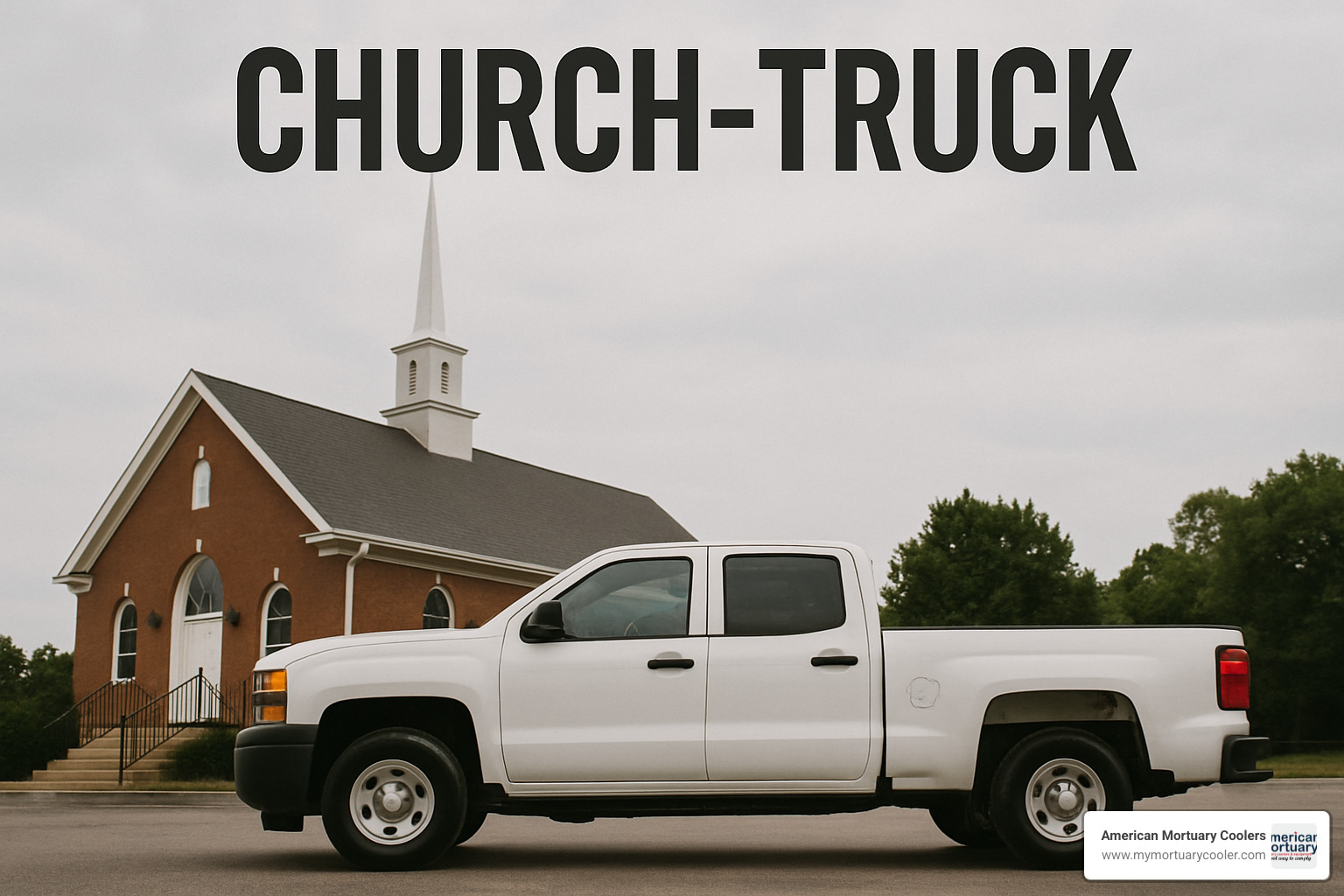
Costs, Financing & Real-World Case Studies
Basic casket trucks start around $395, while premium models with better features run closer to $1,500. Specialized casket transporters handling four caskets cost around $6,900 - significant but worthwhile for busy funeral homes.
Purchase versus lease depends on usage frequency. High-volume funeral homes using trucks daily should purchase. Smaller churches needing occasional equipment might find leasing more budget-friendly.
Choosing the right church-truck- for your congregation
Size matters - don't buy a 57-passenger bus for 15-person groups. Geography plays a huge role too. Rural churches need pneumatic wheels and robust suspension for gravel roads. Urban congregations might prioritize compact storage and quiet operation.
Budget tiers make real differences. Entry-level trucks handle basics reliably. Premium units offer improved durability and longer service life that can save money over time.
A Practical Guide to Choosing Funeral Home Furnishings
Financing paths & grants
Most suppliers offer in-house payment plans with minimal down payments and extended periods. Three-installment options spread costs over quarterly payments - that $6,900 transporter becomes three payments of about $2,375 each.
Community fundraising works when you clearly explain how equipment serves the community. People support church-truck- purchases when they understand the dignity and service benefits.
Unique and notable deployments
At CrossPointe Community Church in Detroit, a deacon used his pickup truck to stop an active shooter. The community raised over $25,000 for replacement through GoFundMe.
Mobile worship concerts use church trucks as mobile stages for outdoor evangelism. Rural churches use church trucks for outreach potlucks, transporting equipment to remote locations for community building.
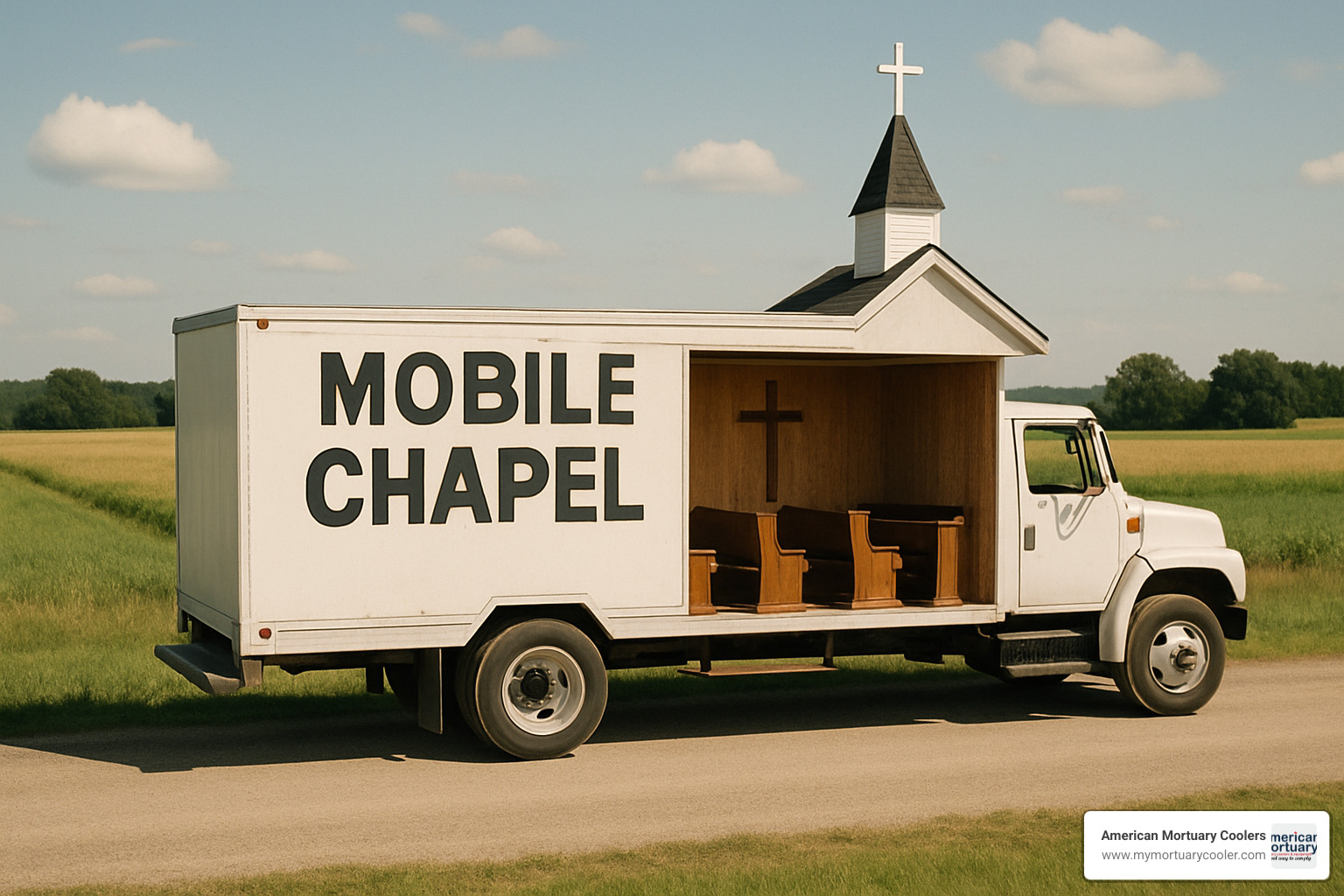
Frequently Asked Questions about Church Trucks
What load capacity should I look for?
When selecting a church-truck-, 1,000-lb capacity handles most funeral operations safely. This standard capacity accommodates typical caskets, which weigh 200-400 lbs empty and reach 600-800 lbs when occupied. You'll find this capacity sufficient for the vast majority of services without straining the equipment.
Premium 1,200-lb capacity units provide extra peace of mind for facilities handling larger caskets or planning for future growth. The additional capacity creates a crucial safety buffer - we always recommend choosing equipment that exceeds your maximum expected load by at least 25%.
This safety margin isn't just about the numbers on paper. It accounts for real-world factors like uneven loading during transport, the dynamic forces that occur when moving over uneven surfaces, and the natural capacity reduction that comes with equipment aging. Think of it as insurance for your most solemn moments.
How often should wheels and brakes be inspected?
Monthly inspections keep your church truck reliable when you need it most. During these checks, examine pneumatic tire pressure, ensure wheel bearings move smoothly, and test that all locking mechanisms engage properly. These simple steps prevent equipment failures during services when replacement isn't an option.
High-volume funeral homes should consider weekly inspections for daily-use equipment. The extra attention pays off by catching small issues before they become major problems. Document your inspection results - this creates a maintenance history that helps predict when components need replacement.
A church-truck- that fails during a service creates stress for families during their most difficult moments. Regular inspections are really about maintaining the dignity and smooth flow that grieving families deserve.
Can one church-truck- serve both indoor and graveside services?
Quality church trucks with pneumatic wheels handle both indoor and outdoor use effectively. The key is choosing models designed for versatility - units that roll quietly over carpet and tile while still managing grass, gravel, and uneven cemetery terrain.
Premium models excel in this dual role because they combine quiet operation for sanctuary services with the terrain capability needed for graveside work. The pneumatic wheels absorb bumps and irregularities while maintaining the respectful silence that indoor services require.
However, high-volume operations might benefit from specialized equipment for each environment. Some funeral homes use rubber-wheeled units optimized for quiet indoor operation alongside pneumatic-wheeled models designed specifically for cemetery conditions. This approach maximizes performance in each setting while ensuring you always have backup equipment available.
The decision often comes down to your service volume and storage space. A single versatile unit works perfectly for most operations, while busy facilities might justify the investment in specialized equipment for optimal performance.
Conclusion & Next Steps
Choosing the right church-truck- equipment preserves dignity during meaningful moments while keeping staff safe and operations smooth. Whether you need a basic 1,000-lb casket truck or specialized mobile ministry vehicle, your equipment choice impacts service quality for years.
At American Mortuary Coolers, we've worked with funeral homes from Johnson City to Los Angeles, understanding that no two facilities have identical needs. Rural Tennessee cemeteries face different challenges than urban California funeral homes.
Quality church-truck- equipment offers durability through properly engineered aluminum frames, pneumatic wheels, and robust locking mechanisms. You're buying peace of mind with units built for thousands of services while maintaining professional appearance.
Our direct delivery across all 48 contiguous states means no distribution delays or damaged equipment arriving at critical moments.
Supplying Serenity: A Guide to Funeral Supply Stores
Planning your next equipment purchase starts with honest assessment. Are existing trucks showing wear? Do they handle your heaviest caskets safely? Can they steer challenging terrain while maintaining dignity?
Consider facility constraints too. Storage space, doorway widths, and service volumes influence which equipment serves you best. A truck folding to 5 inches wide might perfect your space-constrained facility.
Your next step: evaluate your situation and identify where improvements make the biggest difference. Whether replacing aging equipment, adding capacity, or solving operational challenges, we help find solutions within your budget and timeline.
Contact our team to discuss custom solutions for your specific needs. Every family deserves dignified services, and the right equipment makes that possible daily.
